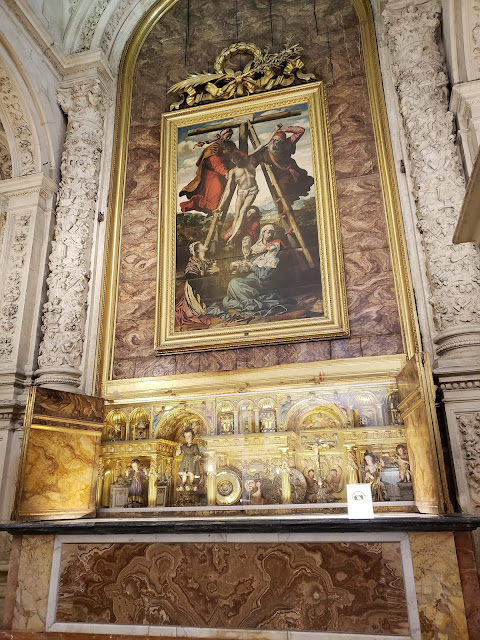The Traditional Matins Reading for where her feast is celebrated:
Joan of Arc was born in the town of Domrémy (which was once in the diocese of Toul, but belongs now to that of Saint Dié) in the year of our Lord 1412. Her parents were noted for their virtue and piety. When she was but thirteen years old, and knew nothing but house work, field work, and the first elements of religion, she learnt that God had chosen her to deliver France from her enemies and restore the kingdom to its former independence. She enjoyed familiar intercourse with the Archangel Michael and SS Catherine and Margaret, who, during five years, instructed her how to fulfill her mission. Then, desiring to obey the command of God, she addressed herself to the governor of Vaucouleurs, who, after having several times repulsed her, at length gave her an escort to take her to King Charles.
Following in all things the divine commands, she overcame all the difficulties of the long journey, and arrived at Chinon in Touraine, where she furnished the king with proofs that her mission was from God. She proceeded to Orleans, and in a few days inflicted three defeats on the enemy, relieved the town, and raised her banner aloft in triumph. Then, after other military successes in which the assistance of God was clearly manifested, she brought Charles to Rheims, where he was solemnly crowned king. She would not rest even then, but, having learnt from her heavenly voices that God would permit her to fall into the hands of the enemy, she went bravely on to meet what was to befall her.
She was taken prisoner at Compiègne, sold to the English, and sent to Rouen for trial. She had to defend herself against many accusations, but her purity was never impugned. She suffered all things with patience for the sake of our Lord Jesus Christ. The wicked judges who tried this gentle and innocent virgin condemned her to be burnt. So, fortified by the Holy Eucharist, which she had long desired, and her eyes fixed upon the Cross, while she constantly murmured the name of Jesus, she took her flight to heaven on May 30, in the nineteenth year of her age. The Holy Roman Church which she had always loved, and to which she had often appealed, undertook, under Pope Calixtus III, her rehabilitation, and towards the end of the nineteenth century, Leo XIII gave permission for the introduction of the cause of beatification. Finally, after diligent examination and approbation of fresh miracles Pius X inscribed her among the Blessed, and permitted the dioceses of France to keep the feast with a special Office and Mass.
Collect Prayer:
O God, you have chosen Saint Joan of Arc to defend her country against the invading enemy. Through her intercession, grant that we may work for justice and live in peace. We pray through Jesus Christ, your son, living and reigning with you and the Holy Spirit, one God forever and ever. Amen.
Secret Prayer:
O Lord, on this feast of Saint Joan of Arc, accept this pure offering of the victim who is our salvation. Grant that we may love you in all things and more than all things so that we may live for the praise of your glory. We pray through Christ our Lord. Amen.
Post Communion Prayer:
You have strengthened us, O Lord, with bread from heaven from which Saint Joan of Arc so frequently found light and comfort. May this heavenly nourishment sustain us in the service of our brothers and sisters. We make our prayer through Christ our Lord. Amen.


















